
By Kalvin Valdillez, Tulalip News
“The first time I got out on the canoe and went outside of Tulalip Bay, I felt a deep connection not only with the water, but with the canoe,” expressed Tulalip tribal member and Canoe Puller, Monie Ordonia. “I felt my ancestor’s gratitude for me being on the water, the silence of serenity is palpable. It was like an interconnection meditation for me. Every time my paddle digs into the water, it’s like a prayer for my people, the community, and for the water with all that live in it.”
The people of the Northwest have been enjoying beautiful sunrays during the late weeks of July. Although safely partaking in outdoor adventures may be a bit more challenging with the threat of contracting the coronavirus, many people are still finding ways to safely soak up some sun such as family bike rides, scenic car trips, or lounging out on the patio. It’s safe to say the sunshine has brightened up spirits across local Native tribes during a dark time period. And although it’s understandable that we all must make necessary adjustments to protect ourselves and our people, many can’t help but miss the yearly summertime journey across the Salish Sea.
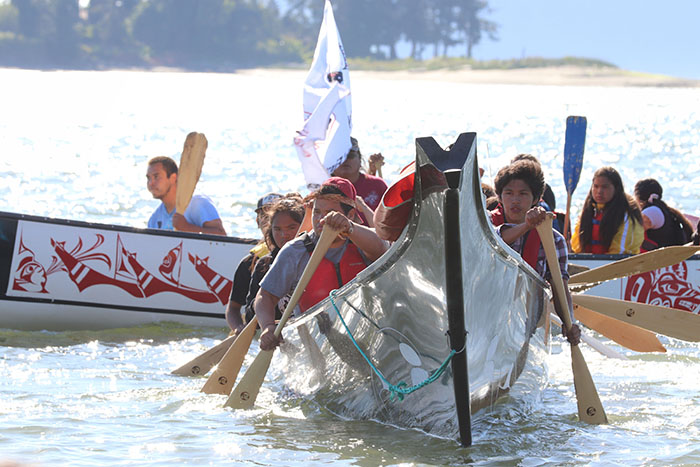
“It was one of those things that was hard to believe,” expressed Tulalip Canoe Family Skipper, Andrew Gobin. “We were getting our canoes ready, we set the practice schedule and we were all planned for journey. We we’re ready to go and all this happened.”
If it were not for the coronavirus, many Natives would be in a cedar dugout canoe this very moment, coasting through the Salish waters and pulling in unison with their canoe family, perhaps offering a traditional song to the sea while enroute to Nanaimo B.C., visiting with different tribes and creating lifelong friendships along the way.
During a colonial celebration, Washington State’s 100th centennial in 1989, Quinault tribal member Emmett Oliver organized an historic moment-in-time, famously known as the ‘Paddle to Seattle’, by calling upon a number of fellow Northwest Treaty Tribes and First Nations bands to participate in a traditional canoe pull into Elliot Bay.
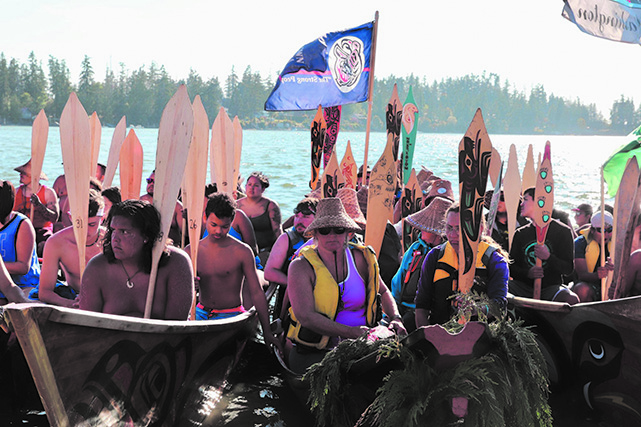
The Paddle to Seattle sparked a cultural revitalization. Once experiencing the medicine offered by the sacred waters, as well as feeling the power of unity amongst coastal Nations, tribal leaders planned the first Tribal Canoe Journey in 1993 with the paddle to Bella Bella. And each summer since, Canoe Journey has been hosted at different villages, helping tribal members reconnect with both their people and ancestral lifeways, while also providing its participants with a lifetime’s worth of memories and healing.
“The first time I did Canoe Journey, there were only ten pullers with our Skipper,” Monie reflected. “No relief pullers, and we didn’t use our support boat to tow us at any time. It was just us pulling to Swinomish. It was a long 10+ hour pull. We were making our final turn to pull up the river to land on Swinomish grounds, we started singing a tribal song and an energy of renewal just came over all of us. We were pulling strong and hard. As soon as we got near the bridge that takes you onto Swinomish land, I became very emotional.
“I couldn’t sing anymore and my eyes were full of tears,” she continued. “My sister Muffy had been the only one of my family who ever done canoe pulling, and she had just passed away in December of 2015. She was the one who inspired me to pull canoe. My grandmother Dora Hilliare Wyakes is buried in Swinomish, so to see that we were pulling up to the bridge that leads to the cemetery where my grandmother was laid to rest, it made me feel like I was honoring both my grandmother and my sister Muffy.”
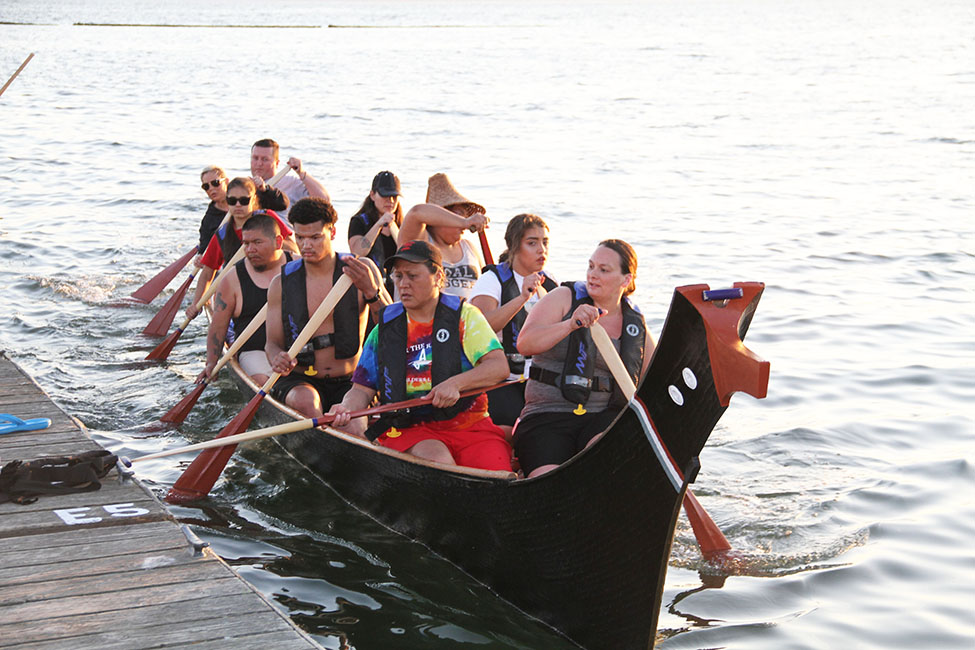
From ’93 until present day there have only been two instances when the Tribal Canoe Journey celebration did not occur, a hiatus in 2015 after no Tribal Nation volunteered for hosting duties, though several tribes did hold small gatherings that year, allowing the canoes the opportunity to still travel the waters. The second instance is this year.
“Before our Tribe even closed, Nanaimo already canceled journey,” explained Andrew. “I thought, like a lot of people, that COVID was just going to be a lot of hype and that it would pass. I was a strong proponent of keeping plans in place and coming up with secondary plans in case journey started up again.”
For Tulalip, Canoe Journey season begins long before their canoes leave the Tulalip Bay shores and extend far past the last song at protocol. In fact, many tribal members dedicate their time months in advance, preparing for journey by harvesting traditional plants and making salves, oils, balms and herbal blends to gift to other tribes during the near month-long experience. The canoe journey participants also take time to practice their traditional songs and dances so when it’s Tulalip’s turn at protocol, their voices are strong and each dance precise, providing medicine while proudly representing the sduhubš way of life.
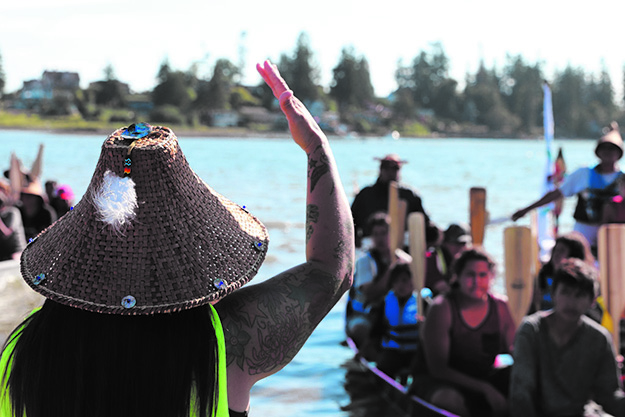
With the absence of this year’s event, many Tulalip canoe family members continued with the work that goes into preparing for journey by harvesting traditional plants and foods within their households and gifting those medicines to local elders as opposed to neighboring tribes. Tulalip singers, dancers and pullers are also staying connected via social media, sharing songs, updates and stories online. Andrew extended his many thanks to the crew who have taken it upon themselves to give back to the community such as Thomas Williams and Dean Pablo.
“I see a lot of people from the canoe family gathering, using this time to harvest, taking advantage of slowing down and taking part in those traditional practices,” Andrew said. “Some of the people on Canoe Journey are turning back to fishing as way to feed their family and their community. People are smoking fish and giving it to our elders. And some of the younger ones are using social media to stay connected this year. The gifts of our people are coming back into the community during this time. When we prepare for Canoe Journey we gather those things and we give them out when we travel. Since we can’t travel, people are taking it on themselves to put it back in their own community.”
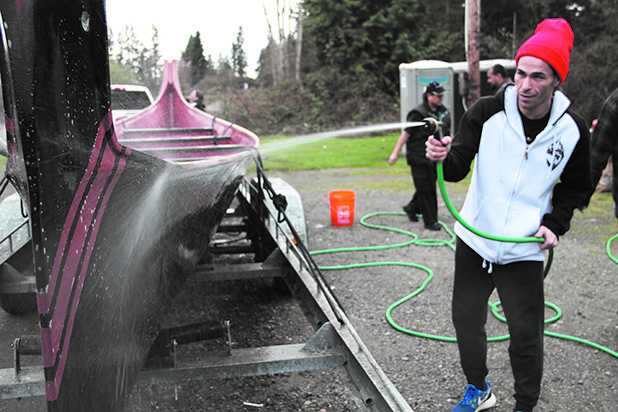
Another tradition of the canoe family is a ceremony that takes place at the beginning of Spring where they formally wake the family canoes, Big Brother and Big Sister, by cleansing and singing songs in their honor, as the canoes are living spirits that come from sacred cedar. The canoes are then taken out on the water twice-a-week until Canoe Journey in order to build up the endurance of the canoes and its pullers.
“I really enjoy practice,” Monie stated. “Getting out on the water as well as the comradery that goes with it. When you practice with mostly the same people every week, they truly become your canoe family. You pull together and sing songs. You encourage each other, so when journey actually begins there is a sense of teamwork, because not one person can pull the canoe by themselves. There is something about sharing your energy on the water in the sacred canoe.”
Though the annual summertime paddle offers healing in many ways, whether it’s pulling on the water, camping and visiting with people from other tribes, or proudly representing your Nation during protocol, many will agree that coming together as a people and forging bonds based on Indigenous culture is one, if not thee, most important aspects of Tribal Canoe Journeys.
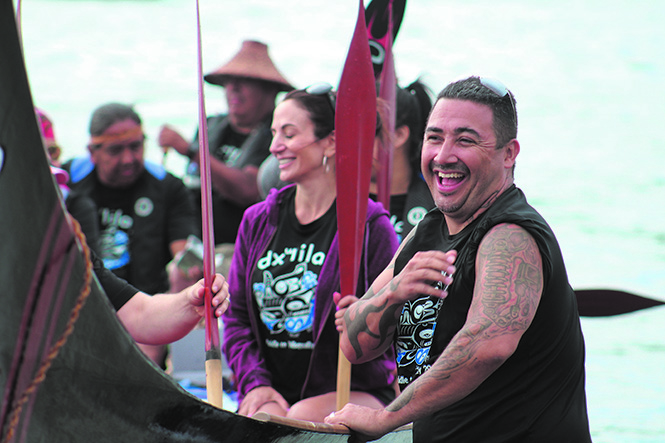
“My favorite part of the journey is that togetherness,” said Andrew. “When we leave Tulalip and travel, we all help each other. We don’t leave anybody behind. If someone needs help, everyone is helping. Everyone is looking out for each other and it really reminds us of the best part of our community and what it means to come together.
“The time on the water, every day is a different adventure. It could be the same crew, same canoe, same paddle, but there’s different jokes and things that happen. Last year, one of the canoes jumped a wave, now those people who were on that canoe all joke about that, they have that unique story they get to reflect on. It’s all about building that community trust and accountability. When we camp and hold circle, everyone is equal, everyone is accountable, everyone has the same responsibilities. Big Shot (Cyrus James) would say, to uphold one another, to care for one another.”
Recently, Nanaimo officially passed the torch to the Tla’amin Nation who plans on hosting the 2021 Canoe Journey festivities in their homeland of Powell River B.C. For more updates, be sure to follow the ‘Tribal Canoe Journeys’ and the ‘Tulalip Canoes’ Facebook pages.